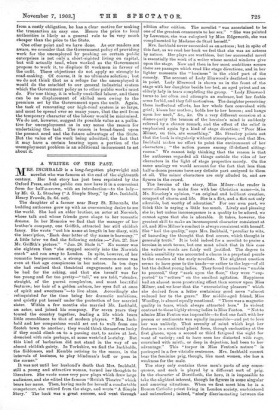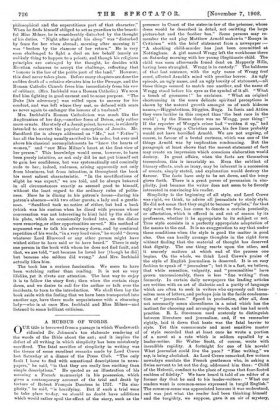A WRITER OF THE PAST.
MRS. INCHBALD is a long-forgotten playwright and novelist who was famous at the end of the eighteenth century. Her best story has just been reprinted by the Oxford Press, and the public can now have it in a convenient form for half-a-crown, with an introduction—to the lady— by Mr. G. L. Strachey ("A Simple Story," by Mrs. Inchbald, Henry Frowde, 2s. 6d. net).
The daughter of a farmer near Bury SL Edmunds, the budding authoress grew up with an overweening desire to see the world. She had an elder brother, an actor at Norwich, whose talk and whose friends gave shape to her romantic dreams. In her Memoirs we find that the manager of her brother's company, one Griffith, attracted her still childish, fancy. She wrote "out his name at length in her diary, with the inscription, Each dear letter of thy name is harmony.'" A little later we find the following entries :—" Jan. 2P. Saw Mr. Griffith's picture." "Jan. 28. Stole it." No sooner was she eighteen than "she stepped secretly into the Norwich coach" and ran away to London. In spite, however, of her romantic temperament, a strong vein of common-sense was even at that age conspicuous in her nature. In ten days she had realised that theatrical engagements are not to be had for the asking, and that she herself was far too young and far too pretty—" tall," we are told, "slender, straight, of the purest complexion, and most bea.etiful features; her hair of a golden auburn, her eyes full at once of spirit and sweetness "—to live alone. Accordingly she relinquished for the time being her dramatic ambitions, and quietly put herself under the protection of her married sister. - Within a few months she melded Mr. Inchbald, an actor, and joined his company. For seven years they toured the country together, leading a life which bears little resemblance to that of modem players. " Mrs. Inch- bald and her companions would set out to walk from one Scotch town to another ; they would think themselves lucky if they could climb on to a passing cart, to arrive at last, drenched with rain perhaps, at some wretched Lostelry. But this kind of barbarism did not stand in the way of an almost childish gaiety. In Yorkshire, we find the Inclibalds, the Siddonses, and Kemble retiring to the moors, in the intervals of business, to play blindman's buff or puss in the corner."
It was not until her husband's death that Mrs. Inchbald, still a young and attractive woman, turned her thoughts to literature. She wrote some very poor plays which drew large audiences, and she edited the famous "British Theatre" which bears her name. Then, having made for herself a comfortable competence, she retired from the stage, and wrote " A Simple Story." The book was a great success, and went through
edition after edition. The novelist " was ascertained to be one of the greatest ornaments to her sex." " She was painted by Lawrence, she was eulogised by Miss Edgeworth, she was complimented by Madame de Steel herself."
Mrs. Inchbald never succeeded as an actress ; but in spite of this fact, as we read her book we feel that she was an actress by nature. Her plays are worthless, but her successful novel is essentially the work of a writer whose mental windows give upon the stage. Now and then in her most ambitious scenes there are passages which read like stage directions, and in her lighter momenta the " business " is the chief part of the comedy. The account of Lady Elmwood's deathbed is a case in point. Lady Elmwood is shown us in the front of the stage with her daughter beside her bed, an aged priest and an elderly lady in tears completing the group. "Lady Elmwood turns to her often and attempts an embrace, but her feeble arms forbid, and they fall motionless. The daughter perceiving these ineffectual efforts, has her whole face convulsed with grief ; kisses her mother; holds her to her bosom ; and bangs upon her neck," &c., &c. On a very different occasion at a dinner-party the tension of the heroine's mind is suddenly relieved by a chance remark, and the effect of the relief is emphasised again by a kind of stage direction: "Poor Miss Milner, on this, ate something." Mr. Strachey points out that the book is singularly without atmosphere, and that Mrs.
inakes no effort to paint the environment of her characters ; " the action passes among ill-defined sitting- rooms." We cannot help thinking that the reason is that the authoress regarded all things outside the roles of her characters in the light of stage properties merely. On the same analogy we would account for the fact that less than half-a-dozen persons have any definite part assigned to them at all. The minor characters are only alluded to, and are figures in the crowd.
The heroine of the story, Miss Milner—the reader is never allowed to make free with her Christian name—is, in Mr. Strachey's opinion, "an original and brilliant creation, compact of charm and life. She is a flirt, and a flirt not only adorable, but worthy of adoration." For our own part, we think this is saying a little too much. Lively and pleasing she is; but unless inconsequence is a quality to be adored, we cannot agree that she is adorable. It takes, however, the greatest skill to make an inconsequent character consistent at all, and Miss Milner's conduct is always consistent with herself. She "had the quality," says Mrs. Inchbald, "peculiar to wits, of hazarding the thought that first occurs, which thought is generally truth." It is bold indeed for a novelist to praise a heroine in such terms, but one must admit that in this case the writer's words are fairly well justified. The degree to which sensibility was accounted a charm is a perpetual puzzle to the readers of the early novelists. The slightest emotion seems to have gone to the heads—or rather to the legs—of all but the dullest young ladies. They found themselves " unable to proceed," they " sank upon the floor," they were " sup- ported" to " settees " on the smallest agitation. Happiness bad an almost more prostrating effect than sorrow upon Miss Milner, and we hear that the "excruciating pleasure" which she derived from a letter containing good news "almost reduced her to the grave." Her middle-aged friend, Miss Woodley, is almost equally emotional. " There was a magnetic quality in tears, which always attracted hers." In violent contrast to these highly strung ladies is Miss Fenton. " Not to admire Miss Fenton was impossible—to find one fault with her person or sentiments was equally impossible—and yet to love her was unlikely. That serenity of mind which kept her features in a continual placid form, though enchanting at the first glance, upon a second or third fatigued the sight for want of variety; and to have seen her distorted with rage, convulsed with mirth, or deep in dejection, had been to her advantage." This " torpor in Miss Fenton's nature " • is portrayed in a few vitriolic sentences. Mrs. Inchbald cannot bear the feminine prig, though, like most women, she has a weakness for the male.
The story only contains three men's parts of any conse- •
quence, and each is played by a different sort of prig. In the character of Dorriforth, the hero, it is impossible to take the slightest interest, though he figures in some singular and amusing situations. When we first meet him be is a Roman Catholic priest living in London society, uncloistered and unbeneficed; indeed, "nicely discriminating between the
• philosophical and the superstitious part of that character." When he finds himself obliged to act as guardian to the beauti- ful Miss Milner, lie is considerably disturbed by the thought of his duties. " Night after night his sleep " was " disturbed by fears for her when abroad; morning after morning it" was " broken by the clamour of her return." He is very soon challenged to fight a duel on her behalf (surely an unlikely thing to happen to a priest), and though his religious principles are outraged by the thought, he decides with Ernstian calmness to accept the challenge, reflecting that " honour is the law of the polite part of the land." However, this duel never takes place. Before many chapters are done the sudden death of a relative elevates him to the Peerage, and the Roman Catholic Church frees him immediately from his vow of celibacy. (Mrs. Inchbald was a Roman Catholic.) We soon find him fighting in good earnest and to some purpose. " The Duke [his adversary] was called upon to answer for his conduct, and was left where they met, so defaced with scars as never again to endanger the honour of a husband."
Mrs. Inchbald's Roman Catholicism was much like the Anglicanism of her day,—another form of Deism, only rather more ornate. Her study of a Jesuit priest, however, is evidently intended to correct the popular conception of Jesuits. Mr. Sandford (he is always addressed as " Mr.," not " Father") has all the learning usually ascribed to his order, but over and above his classical accomplishments he "knew the hearts of women," and "saw Miss Milner's heart at the first view of her person." This knowledge would seem, however, to have been purely intuitive, as not only did be not put himself out to gain her confidence, but was systematically and comically rude to her; indeed, rudeness, arising apparently not only from bluntness, but from intention, is throughout the book his most salient characteristic. " In the mortifications of slight he was expert," we are told, and he always behaved in all circumstances exactly as seemed good to himself, without the least regard to the ordinary rules of polite- ness. Here he is dining in his patron's house—during his patron's absence—with two other guests, a lady and a gentle- man. "Sandford took no notice of either, but had a book (which was his custom when be dined with persons whose conversation was not interesting to him) laid by the side of his plate, which he occasionally looked into, as the dishes were removing, or other opportunities served." His method of argument was to talk his adversary down, and by continual repetition of his words, "in a very loud voice," he would " drown whatever Lord Elmwood or any other person might have wished either to have said or to have heard." There is only one person in the book with whom he does not find fault, and that, we are told, "not because he loved her [though he did] but because she seldom did wrong." And Mrs. Inchbald actually likes him.
The book has a curious fascination. We seem to have been watching rather than reading. It is not so very lifelike, yet it rivets our attention. The best way to enjoy it is to follow the story first; then when the curtain rings down, and we desire to call for the author or talk over the incidents, to turn to the introduction. We shall then lay the book aside with the feeling that we have been transported into another age, have there made acquaintance with a charming lady—who is at once Mrs. Inchbald and Miss Milner—and listened to some brilliant criticism.





























































 Previous page
Previous page